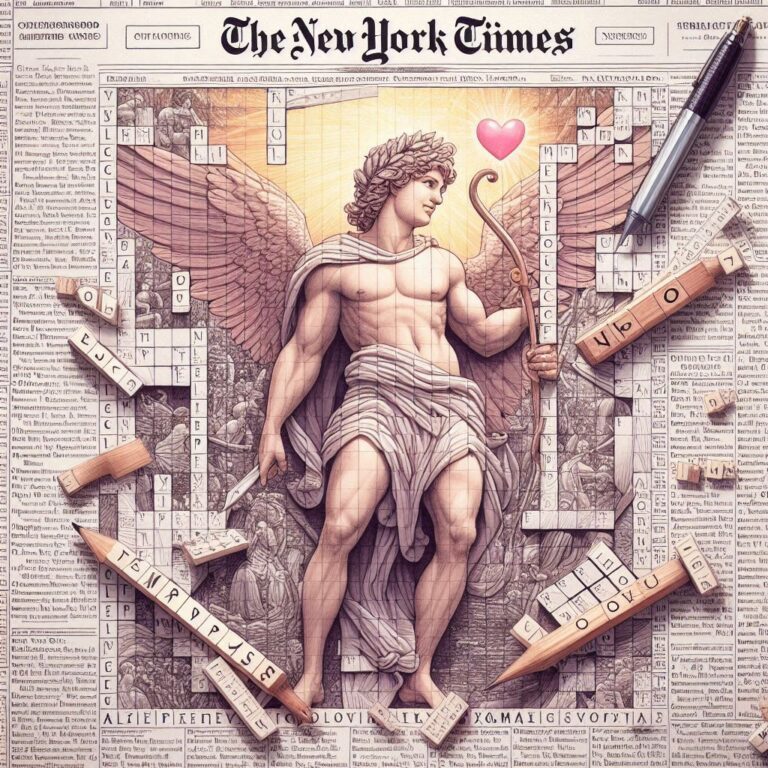In Greek mythology, few deities are as universally recognized as the god of love. This figure, known for stirring passions and forging romantic connections, is a frequent subject in literature, art, and culture. Eros,, has also made regular appearances in The New York Times Crossword, serving as both a fascinating mythological reference and a useful puzzle answer. Here’s a look at who Eros is, his significance, and how he’s often used in crossword clues.
Who is Eros?
Eros is the greek god of love nyt desire, and attraction. In classical mythology, Eros is typically depicted as a youthful and mischievous figure, armed with a bow and arrows that cause love and desire in anyone struck. Depending on the myth, Eros is either portrayed as a primordial god, emerging from Chaos, or as the son of Aphrodite, the goddess of love, and Ares, the god of war.
In Roman mythology, Eros is known as Cupid, a figure equally synonymous with love and romance. Eros is central to many stories about love and passion, often depicted as both a playful and a powerful force in the lives of gods and mortals alike.
Eros in The New York Times Crossword
Given Eros’s iconic status in mythology, it’s no surprise that he frequently appears in the New York Times Crossword. His name is short, vowel-rich, and carries a recognizable mythological weight, making it a favorite among crossword constructors. Here’s how Eros typically shows up in puzzles:
1. Direct References to Greek Mythology
Clues that directly reference Greek mythology or the god of love are straightforward, often leading directly to Eros.
- Clue: “Greek god of love.”
Answer: EROS - Clue: “Son of Aphrodite.”
Answer: EROS
These clues require only a basic knowledge of mythology and are usually easy to solve for most solvers.
2. Roman Mythology Crossover
Sometimes, Eros is referenced indirectly through his Roman counterpart, Cupid. While the answer might be “Cupid,” knowing that Eros is the Greek equivalent can help you navigate these clues.
- Clue: “Roman counterpart of Eros.”
Answer: CUPID
Conversely, clues about Cupid might indirectly hint at Eros, offering an opportunity to think about the mythology more broadly.
3. Love and Desire Themes
Eros might also be clued in a more thematic way, referencing his domain of love and desire. These clues can be slightly more abstract, requiring solvers to connect the concept of love with the god associated with it.
- Clue: “God associated with romantic desire.”
Answer: EROS - Clue: “Hearts and arrows god.”
Answer: EROS
These types of clues draw on Eros’s role and symbolism rather than his direct name, challenging solvers to think critically about the myth.
Why Eros is a Favorite in Crosswords
Eros’s frequent appearances in crossword puzzles aren’t just due to his mythological importance. The structure of his name—short and filled with common letters (E, R, O, S)—makes it a perfect fit for crossword grids. Constructors often use Eros to help balance a puzzle, filling in tricky sections or linking longer answers. The ease with which Eros’s name can be clued, combined with its mythological richness, makes it a versatile and popular choice for puzzle-makers.
Conclusion
Eros, the Greek god of love, continues to be a beloved figure in both mythology and in the world of crossword puzzles. His presence in The New York Times Crossword serves as a reminder of the enduring influence of ancient myths in modern culture. For solvers, recognizing Eros and understanding his role in mythology can provide a quick and satisfying solution to a range of clues. Whether you’re a mythology buff or a casual crossword enthusiast, Eros is a name worth remembering as you navigate the grid.
